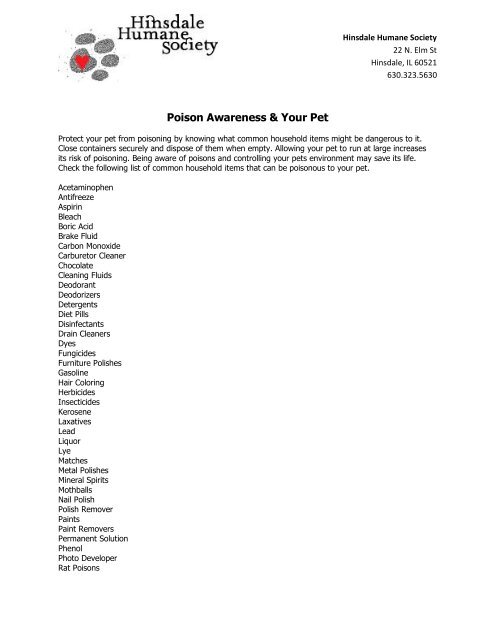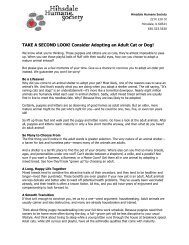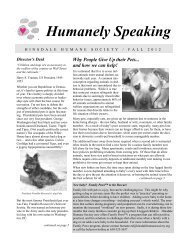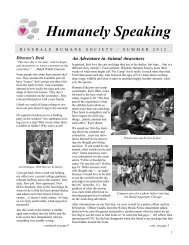Poison Awareness & Your Pet - Hinsdale Humane Society
Poison Awareness & Your Pet - Hinsdale Humane Society
Poison Awareness & Your Pet - Hinsdale Humane Society
Create successful ePaper yourself
Turn your PDF publications into a flip-book with our unique Google optimized e-Paper software.
<strong>Hinsdale</strong> <strong>Humane</strong> <strong>Society</strong><br />
22 N. Elm St<br />
<strong>Hinsdale</strong>, IL 60521<br />
630.323.5630<br />
<strong>Poison</strong> <strong>Awareness</strong> & <strong>Your</strong> <strong>Pet</strong><br />
Protect your pet from poisoning by knowing what common household items might be dangerous to it.<br />
Close containers securely and dispose of them when empty. Allowing your pet to run at large increases<br />
its risk of poisoning. Being aware of poisons and controlling your pets environment may save its life.<br />
Check the following list of common household items that can be poisonous to your pet.<br />
Acetaminophen<br />
Antifreeze<br />
Aspirin<br />
Bleach<br />
Boric Acid<br />
Brake Fluid<br />
Carbon Monoxide<br />
Carburetor Cleaner<br />
Chocolate<br />
Cleaning Fluids<br />
Deodorant<br />
Deodorizers<br />
Detergents<br />
Diet Pills<br />
Disinfectants<br />
Drain Cleaners<br />
Dyes<br />
Fungicides<br />
Furniture Polishes<br />
Gasoline<br />
Hair Coloring<br />
Herbicides<br />
Insecticides<br />
Kerosene<br />
Laxatives<br />
Lead<br />
Liquor<br />
Lye<br />
Matches<br />
Metal Polishes<br />
Mineral Spirits<br />
Mothballs<br />
Nail Polish<br />
Polish Remover<br />
Paints<br />
Paint Removers<br />
Permanent Solution<br />
Phenol<br />
Photo Developer<br />
Rat <strong>Poison</strong>s
<strong>Hinsdale</strong> <strong>Humane</strong> <strong>Society</strong><br />
22 N. Elm St<br />
<strong>Hinsdale</strong>, IL 60521<br />
630.323.5630<br />
Rubbing Alcohol<br />
Shoe Polish<br />
Sleeping Pills<br />
Snail/Slug Bait<br />
Soaps<br />
Suntan Lotion<br />
Tar<br />
Turpentine<br />
Window Cleaners<br />
Wood Preservatives<br />
Any abnormal odor on your pet’s breath or body could be a sign that your pet was exposed to a potential<br />
poison. Cats and dogs react differently to poisons. Keep your veterinarian’s telephone number handy.<br />
If you suspect your pet has been poisoned, keep it warm and dry. Administer any antidote prescribed on<br />
the label<br />
of the household item. Note the symptoms and call your vet immediately. Take your pet to the<br />
veterinarian as quickly<br />
as you can. Take a sample of the poison along to the vet, if you can. Testing for poisons can be very<br />
expensive.<br />
PLANTS POISONOUS to <strong>Your</strong> <strong>Pet</strong> are a special problem since most people don’t know which ones are<br />
hazardous to their pet’s health. Below is a list of plants that could be poisonous to your pet.<br />
Amaryllis<br />
Andromeda<br />
Appleseeds<br />
Arrowgrass<br />
Avocado<br />
Azalea<br />
Bittersweet<br />
Boxwood<br />
Buttercup<br />
Caladium<br />
Castor Bean<br />
Cherry Pits<br />
Chokecherry<br />
Climbing Lily<br />
Crown of Thorns<br />
Daffodil<br />
Daphne<br />
Delphinium<br />
Dieffenbachia<br />
Dumb Cane<br />
Elephant Ear<br />
English Ivy<br />
Elderberry
<strong>Hinsdale</strong> <strong>Humane</strong> <strong>Society</strong><br />
22 N. Elm St<br />
<strong>Hinsdale</strong>, IL 60521<br />
630.323.5630<br />
Foxglove<br />
Hemlock<br />
Holly<br />
Hyacinth<br />
Hydrangea<br />
Iris<br />
Japanese Yew<br />
Jasmine<br />
Jimson Weed<br />
Larkspur<br />
Laurel<br />
Locoweed<br />
Marigold<br />
Marijuana<br />
Mistletoe<br />
Monkshood<br />
Mushrooms<br />
Narcissus<br />
Nightshade<br />
Oleander<br />
Peach<br />
Philodendron<br />
Poinsettia<br />
<strong>Poison</strong> Ivy<br />
Privet<br />
Rhododendron<br />
Rhubarb<br />
Stinging Nettle<br />
Toadstool<br />
Tobacco<br />
Tulip<br />
Walnut<br />
Wisteria<br />
Yew<br />
Some symptoms of poisoning are swelling, cramps, abdominal pain, vomiting, diarrhea, effects on<br />
breathing and circulation, weakness, drooling, and sneezing.<br />
If you suspect your pet has been poisoned, keep it warm and dry. Note the symptoms and call your<br />
veterinarian as quickly as you can. Take a sample of the plant suspected of poisoning your pet along to<br />
the vet, if you can.<br />
Provided by the National Animal Control Association, Kansas City, MO












